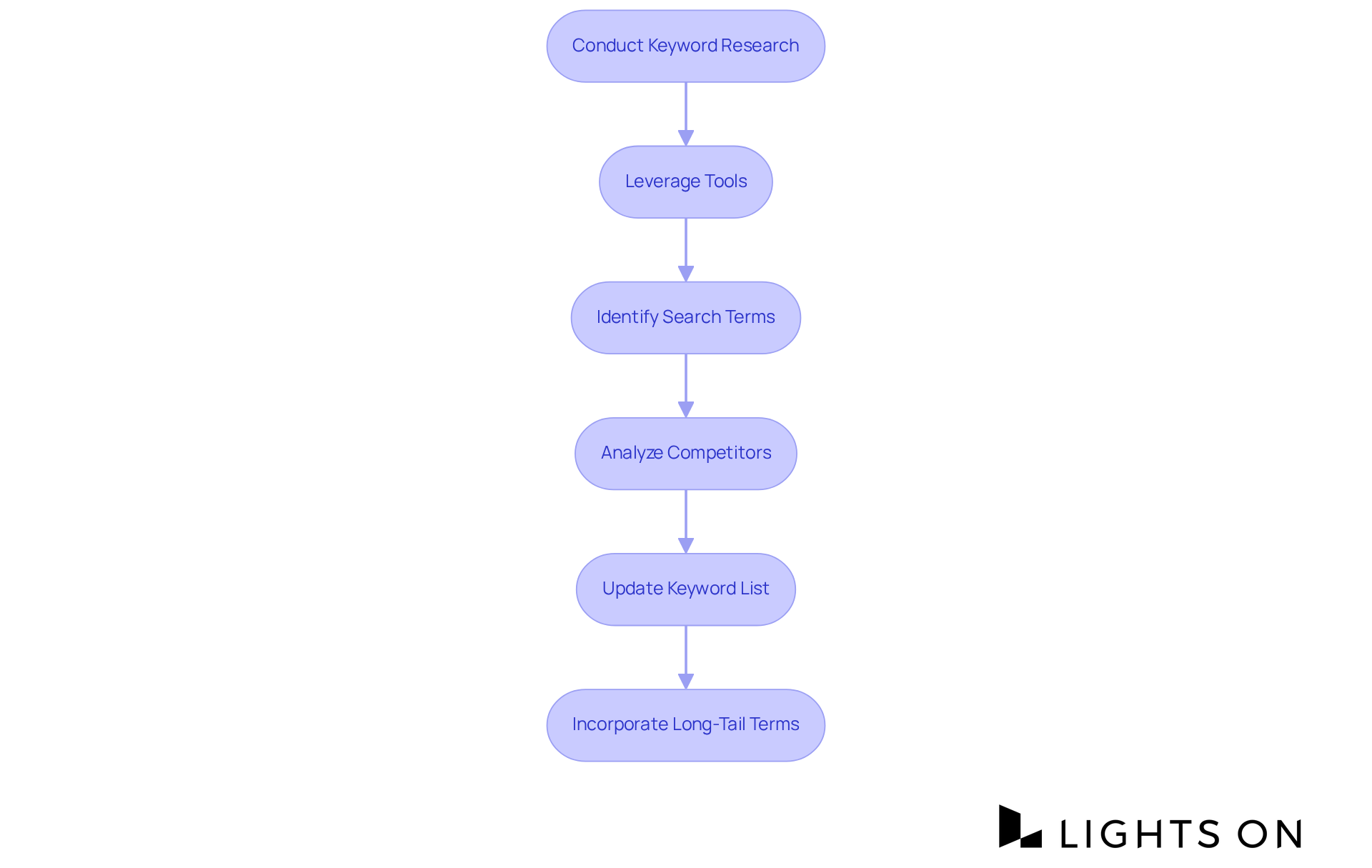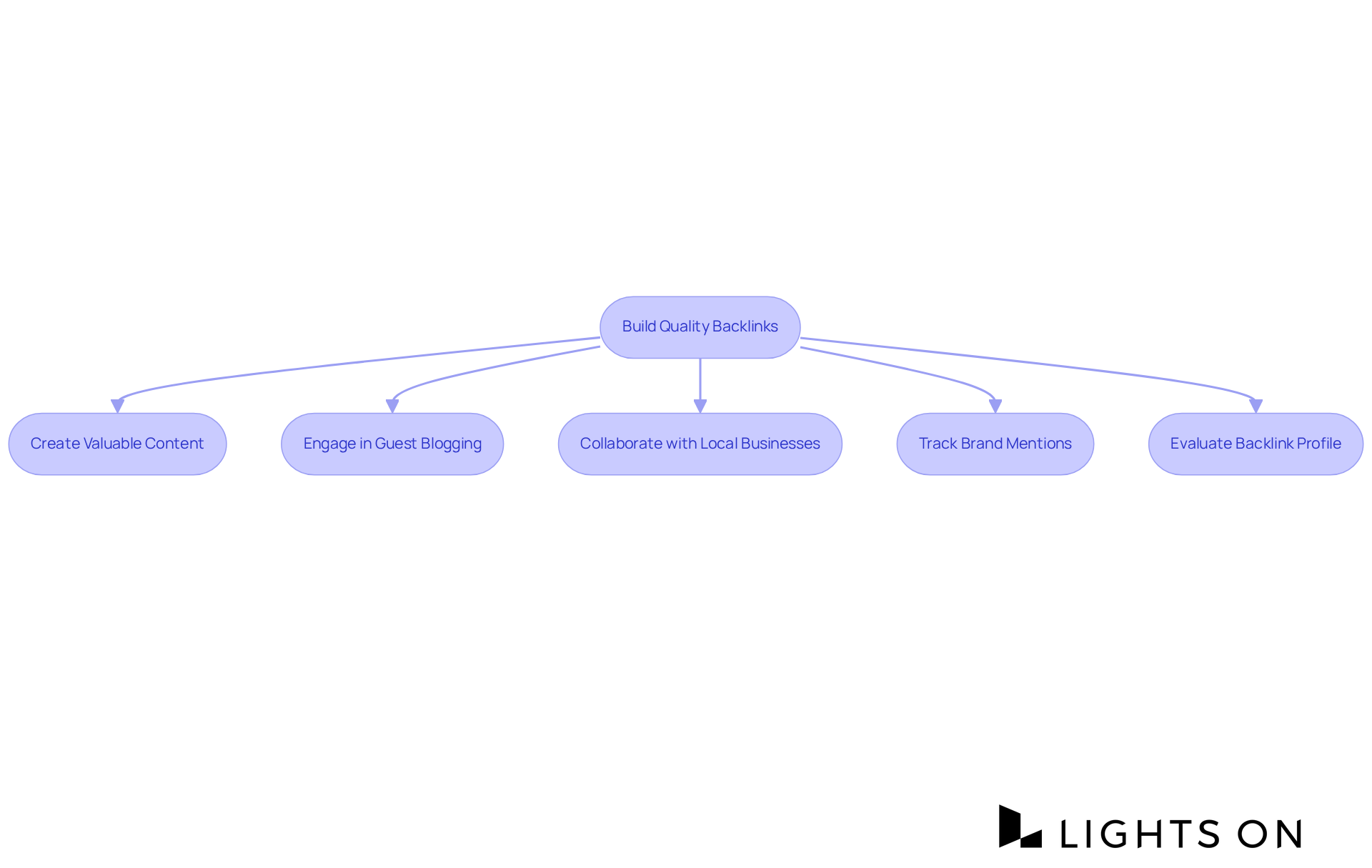The five essential SEO strategies for success in the hotel industry encompass:
These strategies are not merely suggestions; they are crucial for hotels aiming to attract and engage potential guests effectively. By improving search engine visibility, these practices ultimately drive bookings. Supported by data and examples, the impact of these strategies on engagement and revenue is evident, making them indispensable in today's competitive market.
The hotel industry is undergoing a seismic shift as travelers become increasingly discerning, seeking personalized experiences that align with their unique preferences. To thrive in this competitive landscape, hotels must harness effective SEO strategies that not only attract potential guests but also elevate their online visibility.
How can hotel marketers adeptly navigate the complexities of audience targeting, keyword research, and local SEO to drive bookings and cultivate loyalty? This article explores five essential SEO strategies specifically tailored for the hotel industry, offering insights that can transform online presence and enhance success in an ever-evolving market.
To effectively define your target audience, begin by analyzing existing visitor data, conducting surveys, and utilizing market research. Identify key demographics such as age, travel habits, and booking preferences. For instance, if your hotel caters to business travelers, prioritize keywords related to corporate amenities and proximity to business districts. Developing detailed visitor personas can assist in visualizing your audience, enabling more focused marketing efforts. This foundational step ensures that your SEO hotel industry strategy aligns with the needs and expectations of your prospective visitors, ultimately leading to higher engagement and conversion rates.
As highlighted in recent studies, 56% of travelers prioritize custom experiences, making personalization more important than ever. Utilizing is essential for crafting these personas, as it enables establishments to create tailored experiences that improve guest satisfaction and loyalty while adhering to data privacy regulations like GDPR and CPRA. As Karen Stephens observes, 'Say farewell to broad-brush marketing and welcome meaningful revenue-driving connections by utilizing first-party data and the appropriate technology to simplify segmentation.

To conduct effective for accommodations, it is essential to leverage powerful tools like Google Keyword Planner, SEMrush, or Ahrefs. These platforms are instrumental in identifying relevant search terms that potential guests are utilizing. Focus on both short-tail and long-tail phrases that highlight your establishment's unique features. For instance, if your hotel is situated near a prominent tourist attraction, consider phrases such as:
Furthermore, analyzing your competitors can provide valuable insights into the terms they rank for, unveiling market trends and opportunities. It is crucial to regularly update your keyword list based on seasonal trends and visitor feedback to maintain a dynamic and effective strategy in the SEO hotel industry. Incorporating long-tail terms, which tend to be more specific and often less competitive, can significantly enhance your visibility in search results, attracting more qualified traffic to your site. This approach not only improves search engine rankings within the SEO hotel industry but also aligns your content with the intent of prospective visitors, ultimately leading to increased bookings.

To enhance your on-page SEO, prioritize the optimization of critical elements such as:
Each page should seamlessly incorporate relevant keywords, particularly on your homepage, which must highlight your hotel's unique selling propositions alongside location-based keywords. Additionally, creating captivating and informative content that addresses common visitor inquiries—such as local attractions and amenities—can significantly enhance user engagement. Notably, 93% of online journeys begin with a query tool, underscoring the essential role of the SEO hotel industry in attracting potential guests.
Furthermore, applying schema markup is crucial, as it assists search engines in understanding your content, thereby enhancing the chances of featuring in rich snippets. As Neil Patel emphasizes, technical SEO is vital for success in the SEO hotel industry. Regular audits of your website to identify are essential for maintaining optimal performance and ensuring a seamless user experience. In addition, creating relevant and informative content is key for visibility and audience engagement. It's important to remember that effective SEO requires a long-term commitment.

To effectively optimize for local SEO in the hotel industry, it is crucial for your establishment to be prominently listed on Google My Business and other relevant directories, focusing on the SEO hotel industry. Ensure that your profile features accurate details such as your address, phone number, and business hours. Encouraging guests to provide favorable feedback is essential, as these evaluations significantly impact your local ranking. In fact, accommodations with higher ratings and more positive reviews are often favored in search results, increasing their likelihood of attracting reservations.
Furthermore, creating localized content that showcases nearby attractions, events, and activities can further enhance your visibility. For instance, blog posts highlighting local festivals or seasonal events can draw in visitors actively searching for accommodations during those times. Incorporating location-specific keywords throughout your website will also improve your chances of ranking higher in local search results, which is essential for the seo hotel industry to increase foot traffic and direct bookings.
To illustrate the effectiveness of these strategies, consider a case study where an establishment that frequently and promoted visitor reviews experienced a 30% increase in bookings over a six-month period. By concentrating on these strategies, along with effective accommodation marketing tactics such as partnerships with local businesses and targeted promotions, you can position your establishment as a top choice for travelers seeking nearby lodging.

To establish quality backlinks, it is crucial to prioritize the creation of valuable content that attracts links from other websites. This can include comprehensive guides on local attractions or insightful travel tips. Engaging in guest blogging on reputable travel platforms not only boosts exposure but also generates valuable backlinks. For instance, Marriott's M Live platform has successfully driven awareness through influencer outreach, demonstrating the effectiveness of strategic partnerships in enhancing brand visibility.
Furthermore, forming collaborations with local businesses and tourism boards can create mutually beneficial opportunities that lead to additional backlinks. It is essential to track online brand mentions and proactively contact sites that refer to your establishment without linking back, asking for a link to improve visibility. Regularly evaluating your backlink profile using tools like Moz or Ahrefs helps identify areas for improvement, ensuring that your backlinks originate from reputable sources.
In addition, be aware of common pitfalls in backlink building, such as focusing on quantity over quality, which can harm your site's authority. This strategic approach not only within the SEO hotel industry but also contributes to improved search engine rankings. By implementing these strategies, you can effectively build a robust backlink profile that elevates your online presence.

To achieve success in the hotel industry, leveraging strategic SEO practices is paramount. Understanding the nuances of your target audience, conducting thorough keyword research, optimizing on-page elements, enhancing local SEO, and building quality backlinks are essential components that can significantly elevate a hotel's online presence. Each of these strategies not only serves to improve visibility but also fosters deeper connections with potential guests, ultimately driving bookings and loyalty.
Key insights from the article highlight the importance of personalization through audience analysis. The need for comprehensive keyword strategies, the critical role of on-page SEO elements, the advantages of local optimization, and the value of quality backlinks are indispensable. By implementing these tactics, hotels can align their marketing efforts with the expectations of modern travelers, ensuring that they stand out in a competitive market.
The significance of these SEO strategies cannot be overstated. In a landscape where travelers are increasingly seeking tailored experiences, hotels must embrace these practices to thrive. By focusing on effective audience engagement, leveraging data-driven keyword insights, and enhancing local visibility, establishments can not only attract more guests but also cultivate lasting relationships that drive repeat business. Embracing these strategies is not just beneficial but essential for any hotel aiming to succeed in today’s dynamic environment.
How can I define my target audience for effective SEO in the hotel industry?
To define your target audience, analyze existing visitor data, conduct surveys, and utilize market research. Identify key demographics such as age, travel habits, and booking preferences. Developing detailed visitor personas can help visualize your audience and focus your marketing efforts.
Why is personalization important in targeting my audience?
Personalization is crucial because 56% of travelers prioritize custom experiences. Utilizing first-party data allows establishments to create tailored experiences that enhance guest satisfaction and loyalty while complying with data privacy regulations like GDPR and CPRA.
What tools can I use for comprehensive keyword research?
Effective tools for keyword research include Google Keyword Planner, SEMrush, and Ahrefs. These platforms help identify relevant search terms that potential guests are using.
What types of keywords should I focus on for my hotel?
Focus on both short-tail and long-tail phrases that highlight your establishment's unique features. For example, use phrases like 'luxury hotel near [Attraction Name]' or 'family-friendly lodgings in [City Name].'
How can analyzing competitors help my keyword strategy?
Analyzing competitors can provide insights into the terms they rank for, revealing market trends and opportunities. This information can help you refine your keyword strategy.
Why is it important to regularly update my keyword list?
Regularly updating your keyword list based on seasonal trends and visitor feedback ensures a dynamic and effective SEO strategy, helping maintain visibility and attract qualified traffic to your site.
What are the benefits of using long-tail keywords?
Long-tail keywords are more specific and often less competitive, which can significantly enhance your visibility in search results. They also align your content with the intent of prospective visitors, leading to increased bookings.
Transform your group booking strategies with Lights On and watch your occupancy soar.